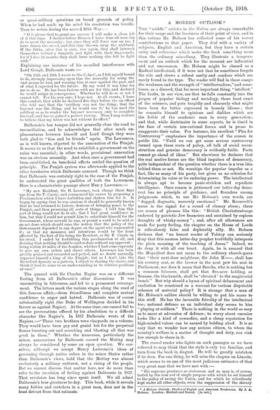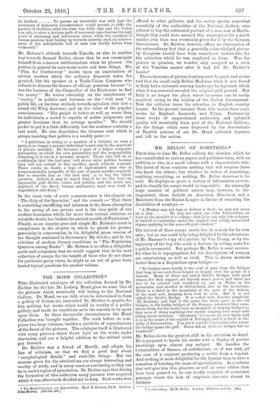A MODERN OUTLOOK.*
THE " middle " articles in the Nation are always remarkable for their range and the freshness of their point of view, and in this volume Mr. Hobson has collected some of his recent contributions to that paper. They deal with a variety of
subjects, English and American, but they have a certain unity and coherence which make the book something more than the ordinary miscellany. They illustrate a tempera- ment and an outlook which for the moment are influential and not uncommon. Mr. Hobson might be classed as a Radical intellectual, if it were not that he sometimes forgets the role and shows a robust sanity and candour which are rarely found in the type. The reader will find in these essays the weakness and the strength of "intellectualism," and some- times, as a discord, that far more important thing, "intellect."
The faults, in our view, are that he falls constantly into the jargon of popular biology and sociology, those least exact of the sciences, and puts turgidly and obscurely what might have been far better expressed in homely idioms ; that he commits himself to opinions and dislikes which are the foible of the academic man in every generation ; and that, while doctrinaire in some aspects, he is timid in the face of certain non-rational forces and is prone to exaggerate their value. For instance, his excellent "Plea for Controversy" emphasises the importance of the reason in public life. "Until we can get some serious controversy turned upon these roots of policy, all talk of social recon- struction and genuine democracy is evidently futile. Facts cannot go ahead of ideas." But elsewhere he declares that the real motive forces are the blind impulses of democracy, quite independent of the question whether there is a true idea behind them or not. He worships the popular impulse as a fact, like so many of his party, but gives us no criterion for determining its value or its enduring power. The intellectual is always apt to become panic-stricken and repudiate intelligence. Once reason is jettisoned our latter-day deino- crab has no principle of guidance, and flounders among judgments which, to use Mr. Hobson's own words, are "dogged, dogmatic, narrowly emotional." Mr. Roosevelt's
name is the signal for a round of clumsy abuse; there are scores of phrases like this "British Charlottenburgs
endowed by patriotic Jew financiers and sustained by copious draughts of whisky-money " ; and, after all allowances are made for party feeling, the chapter on the House of Lords is ridiculously false and deplorably silly. Mr. Hobson declares that "no honest reader of Tolstoy can seriously deny that this austere latter-day prophet truthfully interprets the plain meaning of the teaching of Jesus." Indeed, we do deny it with all our heart. Again, he is amazed that the 'Magni:0ot does not mean to the ordinary church-goers that "their next-door neighbour, Sir John M—, shall lose his country seat, or the brewer in the next pew his seat in Parliament, nor does it mean that Snooks, who is nothing but a common labourer, shall get that five-acre holding, or Soames, the blacksmith, shall be ' elevated ' to the magisterial bench." But why should a hymn of spiritual debasement and exaltation be construed as a warrant for various disputable schemes of material policy ? It is strange that a man of Mr. Hobson's calibre should be willing to put his name to this stuff. He has the incurable frivolity of the intellectual too ; national defence as an individual duty seems to him "playing at soldiers." There is nothing in the world so easy as to sneer at advocates of defence ; to worry about enemies looks like a kind of cowardice, and a cheap reputation for high-minded valour can be earned by holding aloof. It is so easy that we wonder how any serious citizen, to whom the country's welfare is a matter of thought and duty, can sink low enough to share in it.
The casual reader who lights on such passages as we have referred to may think that the style is only too familiar, and turn from the book in disgust. He will be greatly mistaken if be does. For one thing, he will miss the chapter on Lincoln, which seems to us one of the most judicious estimates of that very great man that we have met with :—
" His supreme greatness as statesman and as man is, of course, tested by the iron rod of single purpose with which he set himself to the policy of saving the Union, and for which he relentlessly kept under all other objects, even the suppression of the slavery • A Modern Outlook: Studies of English and American Tendencies. By J. A. Hobson. London: Herbert and Daniel. Os. net.]
he loathed. To pursue an inevitable war with just the maximum of humanity circumstances would permit, to stifle the passion of abolition until the time was fully ripe and the Union was safe, to steer a devious path of necessary opportunism through years of unceasing and unforeseen crises, when the cauldron of human passions kept boiling up towards anarchy, such an achieve- ment of the indomitable will of man has hardly before been witnessed."
Mr. Hobson's attitude towards Lincoln, as also in another way towards Samuel Butler, shows that he can emancipate himself from a narrow intellectualism when he pleases. On politics in general he says many acute and true things. His "Plea for Controversy" insists upon an examination of certain matters which the ordinary democrat takes for granted, like the speaker at a Trade-Union Congress who refused to discuss the finance of old-age pensions because "it
was the business of the Chancellor of the Exchequer to find the money." He writes admirably on the interference of " society " in politics and business, on the "wild man" in public life, on the true attitude towards agitation (this last a sound old Whig doctrine), and on the value of the popular consciousness. "The people is better as well as worse than its individuals, a crowd is capable of nobler judgments and greater heroisms than its average member." We should prefer to put it a little differently, but the sentence contains a real truth. He also demolishes the tiresome cant which is always insisting that polities is a muddy game :—
"A politician, in acting as a member of a Cabinet, or even a party,is no longer a private individual bound only by the sanctions of private morality. He becomes a part of a larger composite personality, in which his own personality and the responsibility attaching to it are in a measure merged. Those who tell us so confidently that 'the best men' will never enter politics because they u-ill not submit to this sacrifice, speak without warrant. There exists, no doubt, a type of high-minded man who is temperamentally incapable of the sort of moral sacrifice required. But to describe him as 'the best man' is to beg the whole question. Indeed, it may be urged that, if he be the best,' an impassable gulf divides ethics and politics, and the latter art, deprived of the finest human sustenance, must ever tend to degradation and decay."
In the same vein of acute common-sense is the chapter on "The Grip of the Specialist," and the remark :—" That there is something unsufficing and inhuman in the fierce absorption in the saving of our private soul is the Very spirit of our modern humanism which, far more than textual criticism or scientific doubt, has broken the ancient moulds of Puritanism."
Finally, as an essayist pure and simple Mr. Hobson's merit is conspicuous in the chapter in which he pleads for greater
generosity in conversation, in his delightful prose version of the thought contained in Stevenson's My Garden, and in his criticism of modern literary conditions in "The Population Question among Books." Mr. Hobson is so often a delightful
guide and companion that we would suggest that in his next collection of essays, for the benefit of those who do not share his particular party views, he might as an act of grace leave heated top:cal questions for another volume.















































 Previous page
Previous page